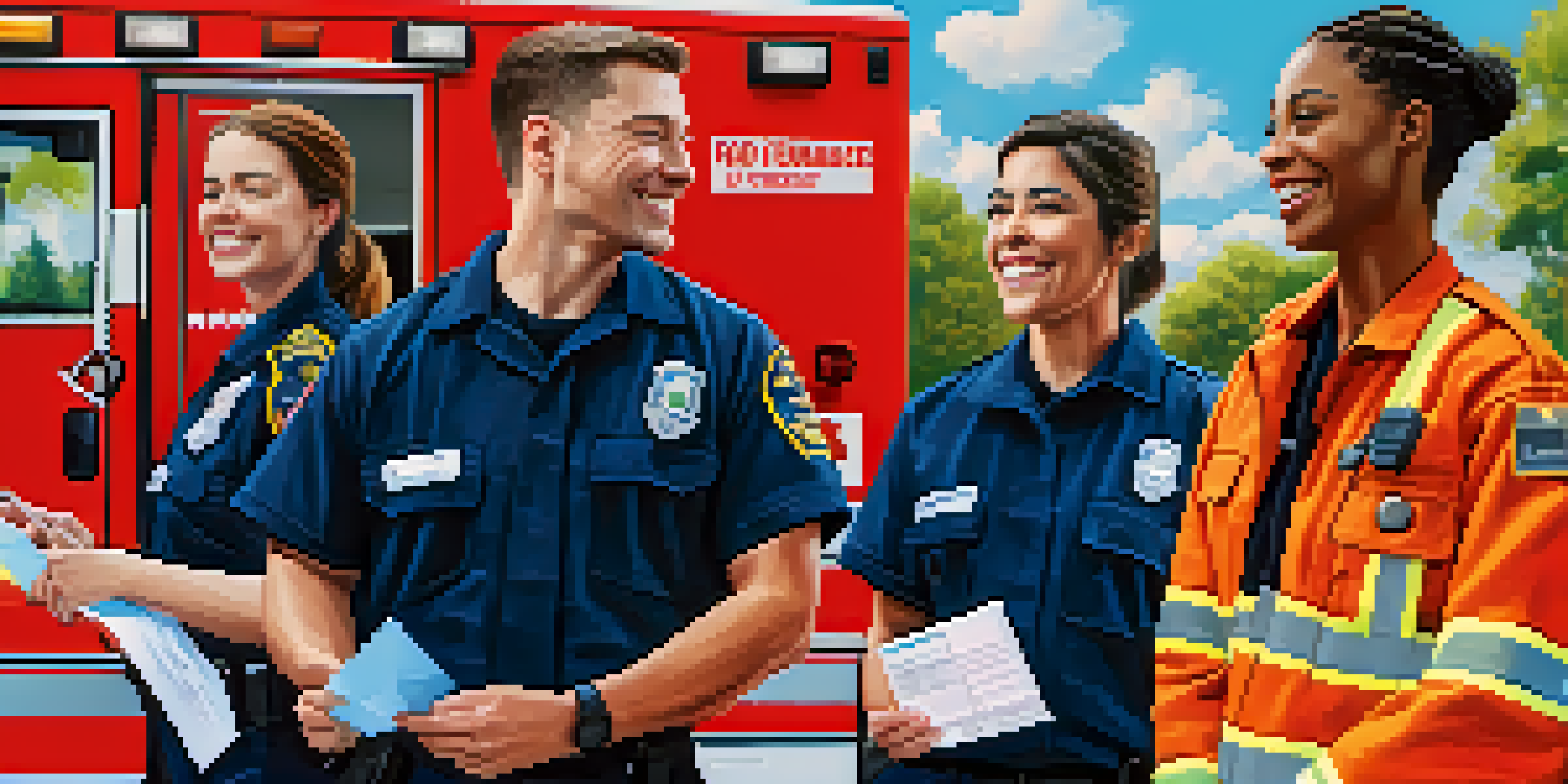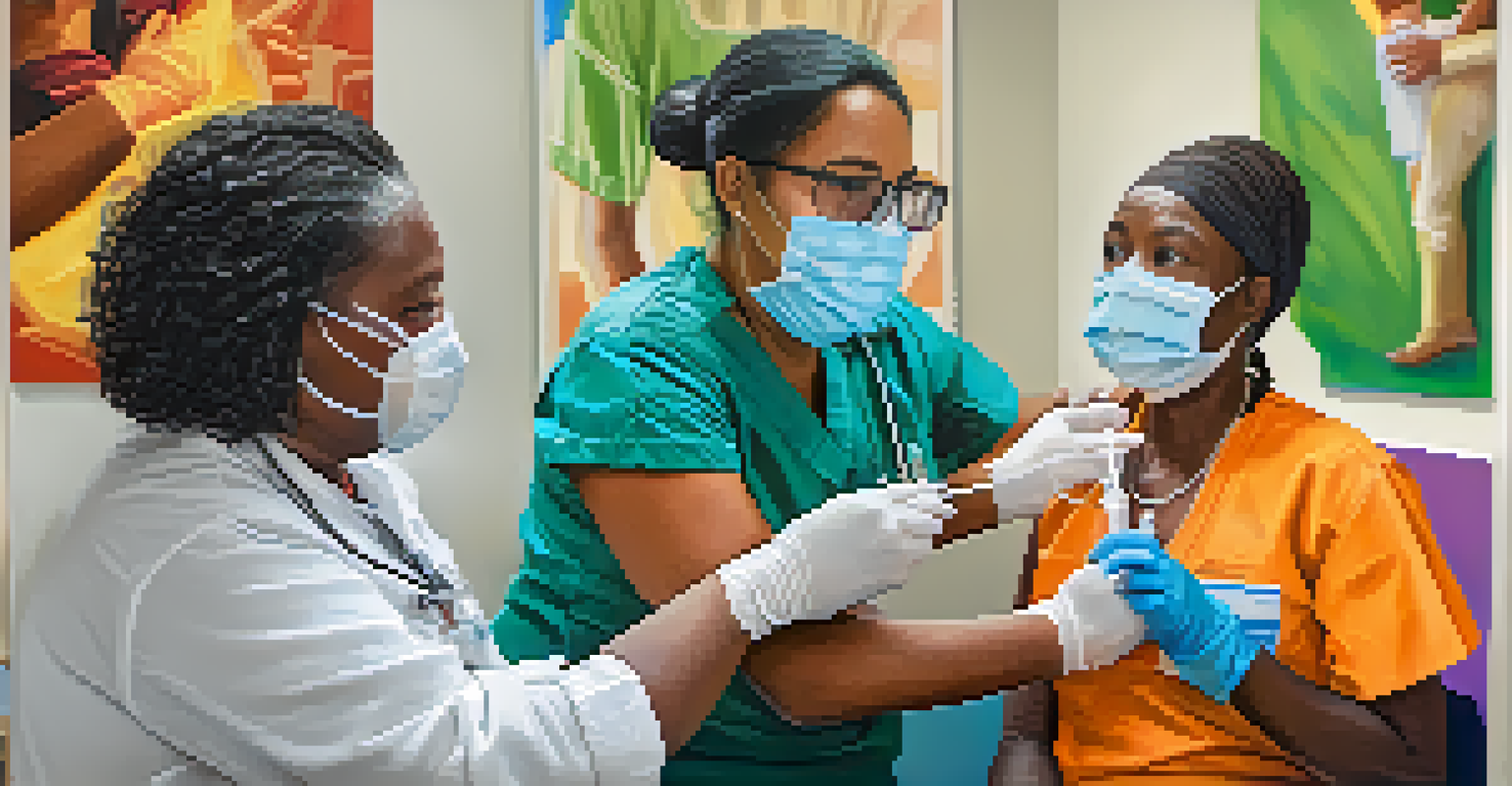The Importance of Vaccination for Emergency Responders

Why Vaccination is Essential for Emergency Responders
Emergency responders, including paramedics and firefighters, often work in high-risk environments where exposure to infectious diseases is prevalent. Vaccination is a critical line of defense, helping to protect not only the responders themselves but also the communities they serve. By getting vaccinated, responders reduce the chances of outbreaks within their teams and in the populations they assist.
Vaccination is the most effective way to prevent the spread of infectious diseases.
In situations where speed and efficiency are vital, being healthy and ready to respond can make all the difference. Vaccinations help ensure that emergency responders maintain their physical health, which is essential for their demanding roles. A vaccinated workforce means fewer sick days and more personnel available during crises.
Moreover, vaccines contribute to herd immunity, which protects vulnerable populations who may not be able to get vaccinated themselves. By being vaccinated, emergency responders act as a shield for others, underscoring their role not just as responders but as community protectors.
Common Vaccinations for Emergency Responders
Several vaccinations are particularly important for emergency responders, including influenza, hepatitis B, and tetanus. The flu vaccine is crucial due to the seasonal outbreaks that can lead to increased hospitalizations and fatalities. Responders who are vaccinated can reduce the spread of the virus among their colleagues and the communities they serve.

Hepatitis B vaccination is vital as it protects against a virus that can be transmitted through blood and bodily fluids, common exposures in many emergency situations. Tetanus shots are also important, especially for those who may encounter sharp objects or wounds while on duty.
Vaccination Protects Responders
Emergency responders who are vaccinated help safeguard their health and the well-being of the communities they serve.
In addition to these, responders may receive other vaccines based on their specific roles and the environments they operate in, such as MMR (measles, mumps, and rubella) and pertussis. Staying up to date with vaccinations is a professional responsibility that enhances the safety of the responders and their teams.
The Impact of Vaccination on Public Health
Vaccination plays a pivotal role in public health, especially in preventing the spread of infectious diseases. Emergency responders are often the first point of contact during health emergencies, so their immunization status directly affects the communities they serve. By limiting disease transmission, they help maintain public trust in healthcare systems.
The best way to protect yourself and your community is to get vaccinated.
When emergency responders are vaccinated, they contribute to lower rates of illness in the communities they serve. This leads to fewer hospitalizations and less strain on healthcare resources during outbreaks. Essentially, the health of responders becomes intertwined with the health of the community.
Additionally, vaccination campaigns led by emergency responders can educate the public about the importance of immunization. Their visible commitment to vaccination can influence community attitudes and encourage more people to get vaccinated, further enhancing overall public health.
Addressing Common Misconceptions About Vaccines
Despite the overwhelming evidence supporting vaccination, misconceptions still exist. Some people believe that vaccines can cause the diseases they are meant to prevent, but this is a myth. Vaccines are rigorously tested for safety and efficacy, ensuring they provide protection without causing illness.
Another common misconception is that vaccines are unnecessary if one is healthy. However, healthy individuals can still carry and transmit diseases to others, particularly those who are more vulnerable. Vaccination not only protects the individual but also serves as a public health measure.
Herd Immunity Benefits Everyone
By getting vaccinated, emergency responders contribute to herd immunity, protecting vulnerable populations who cannot be vaccinated.
Emergency responders often face these misconceptions in their communities. By being educated and vocal about the benefits of vaccination, they can help dispel myths and provide factual information, ultimately fostering a healthier community.
The Role of Employers in Promoting Vaccination
Employers play a crucial role in promoting vaccination among emergency responders. By providing access to vaccines at work, they can eliminate barriers that might prevent employees from getting vaccinated, such as time constraints or financial concerns. Offering educational resources about the importance of vaccines can also empower responders to make informed choices.
Incentives, such as paid time off to get vaccinated or wellness programs that encourage immunization, can further motivate responders. Creating a culture that prioritizes health and safety sends a strong message about the value of vaccination.
Employers can also lead by example, ensuring that their leadership teams are vaccinated. This not only sets a standard but also illustrates a commitment to the health and safety of all employees, reinforcing the idea that vaccination is a collective responsibility.
Vaccination Records and Monitoring
Maintaining accurate vaccination records is essential for emergency responders. These records help ensure that individuals are up to date with their vaccinations and can provide proof of immunization when necessary. This is particularly important in emergency situations where certain vaccinations may be required for deployment.
Regular monitoring of vaccination statuses can also help identify any gaps in immunization coverage among responders. By implementing a system for tracking vaccinations, employers can proactively address any issues and ensure their teams are fully protected.
Employers Drive Vaccination Efforts
Employers play a vital role in promoting vaccination by providing access, education, and incentives for emergency responders.
Moreover, vaccination records can play a role in public health reporting. When emergency responders are vaccinated, employers can share aggregate data with public health authorities, contributing to broader vaccination efforts and strategies to combat infectious diseases.
The Future of Vaccination in Emergency Response
As we look to the future, the landscape of vaccination in emergency response continues to evolve. New vaccines are being developed, and existing ones are being updated to address emerging infectious diseases. Emergency responders must stay informed about these changes to ensure they are protected against the latest threats.
Additionally, the COVID-19 pandemic has highlighted the importance of vaccinations in maintaining operational readiness. Lessons learned during this time will likely guide future vaccination policies and practices within emergency services.

The ongoing commitment to vaccination will not only enhance the safety of emergency responders but also fortify public health initiatives. By prioritizing immunization, emergency responders can remain effective and resilient in the face of new challenges.